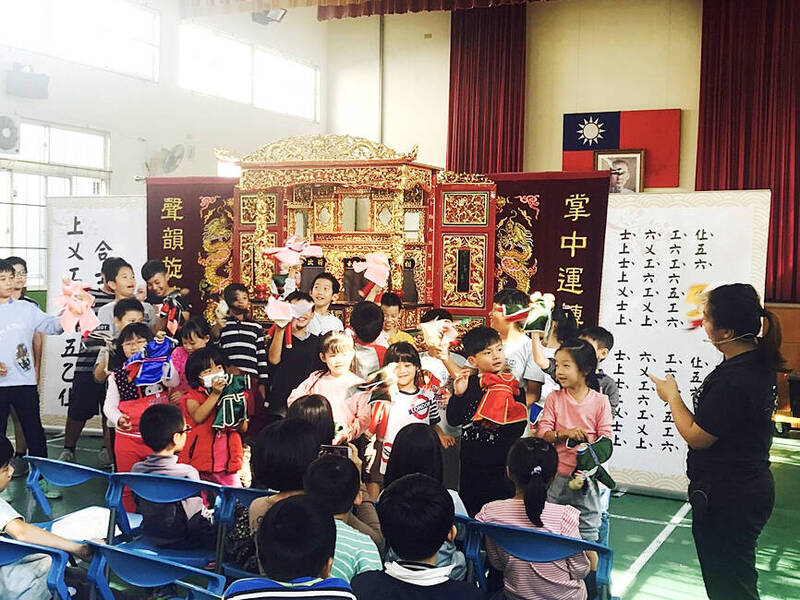《TAIPEI TIMES》Majority feel ‘native’ languages are disappearing: poll

Students play with puppets in a class teaching Hoklo (commonly known as Taiwanese) at an elementary school in Taoyuan in an undated photograph. Photo courtesy of the Taoyuan Department of Education
By Rachel Lin and Jake Chung / Staff reporter, with staff writer
A majority of Taiwanese, or 68.4 percent, feel that “native” languages are in danger of disappearing, a poll released yesterday by the Professor Huang Kun-huei Education Foundation showed.
Previous policies vigorously promoting Mandarin have crippled the development of native languages, foundation chairman Huang Kun-heui (黃昆輝) said.
Of the poll’s respondents, 37.2 percent said that the Ministry of Education’s policies effectively preserve native languages, he said.
While 93.9 percent of those polled said that speaking native languages with family members is the best way to learn a language, 67.5 percent said their family members could not speak native languages, demonstrating that such methods are not the most effective, Huang said.
Citing Ministry of Culture data, Huang said that the use of Hoklo (commonly known as Taiwanese) has dropped by nearly 60 percent within the past three generations, while the use of Hakka has fallen 70 percent, and the use of indigenous languages has plummeted by almost 90 percent.
The less a language is used, the more likely it is of becoming endangered or extinct, and the preservation and restoration of native languages in Taiwan is a task that cannot be put off any longer, Huang said.
Foundation member Feng Ching-huang (馮清皇) said that about 64.9 percent of the respondents still used their native tongue daily.
Broken down into region, Tainan, and Yunlin and Chiayi counties had the largest percentage of people who speak a native tongue daily at 82.4 percent, followed by Taichung, and Changhua and Nantou counties at 73.6 percent, and Kaohsiung, and Pingtung and Penghu counties at 73.3 percent, Feng said.
The poll showed that the use of native languages dropped in conjunction with the respondents’ age, Huang said.
Feng said that 91.5 percent of respondents aged 65 or older used a native tongue frequently, followed by those aged 50 to 64 at 73.3 percent.
Respondents with a junior-high school education or lower used native languages the most, at 90.6 percent, followed by those with a high-school or vocational high-school education at 70.2 percent, Feng said.
National Cheng Chi University Graduate Institute of Taiwan History chairman Hsueh Hua-yuan (薛化元) said it is a basic human right to use one’s native language.
Government policies have previously infringed upon that right, resulting in the prevalence of Mandarin in education, government and mass media, Hsueh said.
The Development of National Languages Act (國家語言發展法) has provided a legal basis to help protect local languages, but the preservation and development of the native languages of multiple ethnicities is still an uphill battle, he said.
新聞來源:TAIPEI TIMES



















